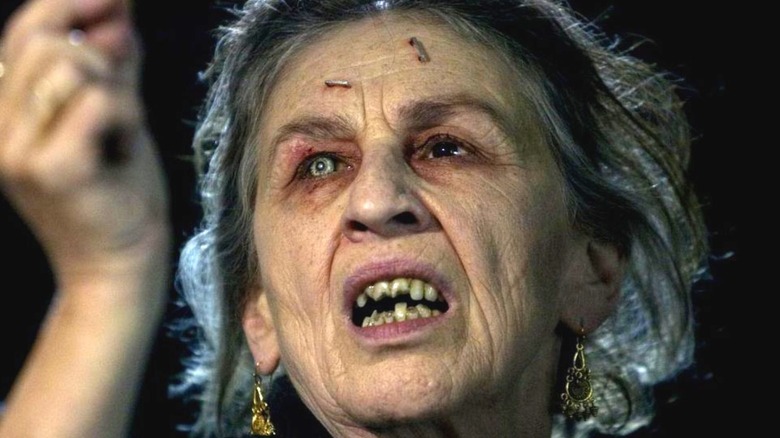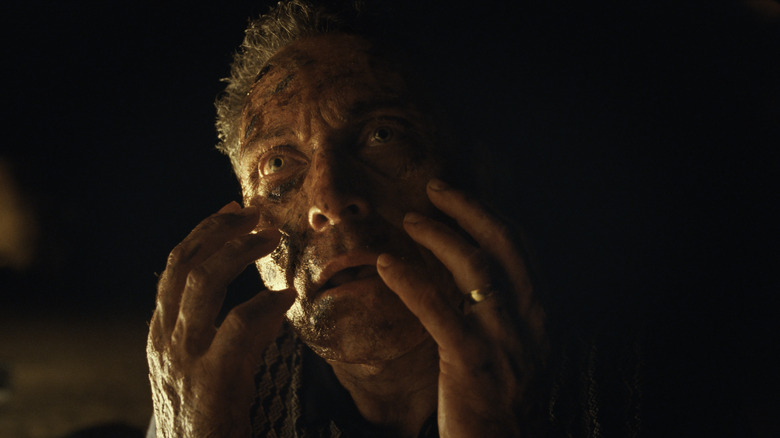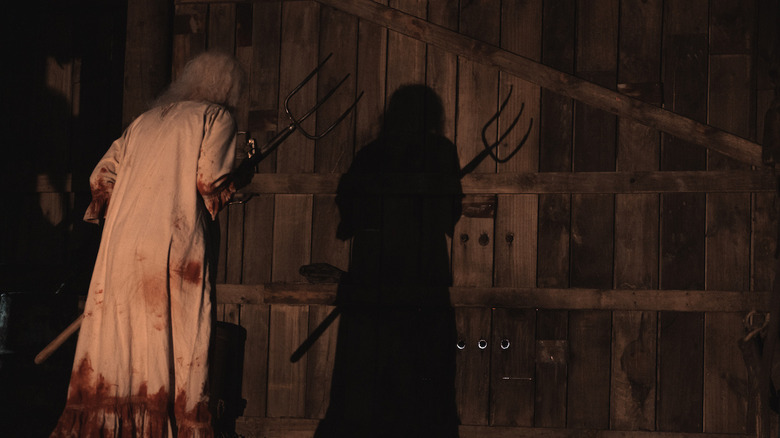Why Are Old People Meant To Be Scary?
In "X", the new '70s-inspired horror film by Ti West, a ragtag group of filmmakers go on a road-trip through Texas to make a porno. They intend to shoot in the guesthouse of an elderly couple who are unaware of their plans, but in true horror fashion, it doesn't take long for the unwitting old people to reveal their sinister truth. Pearl, one half of the pair, speaks often of her hatred of aging and her jealousy of the gorgeous heroine's youth, then demonstrates her still-eager sex drive to the horrified lead. Driven by their envy over their own wasted pasts, Pearl and her husband Howard start picking off the kids one by one.
"X" takes great pains to emphasize the grotesque nature of Pearl, who is actually played by Mia Goth, the 29-year-old actress who also plays the young porn-star lead. The makeup, which took close to eight hours to apply each day, totally conceals Goth's unique beauty and makes her seem more corpse-like than your typical elderly woman. It's a striking image, to be sure, and one that horror cinema has made a common feature of the genre. Vampires or zombies may come and go out of fashion but there's something about being old or facing it that remains eternally scary to audiences and filmmakers alike.
What's behind the horror trope of the scary old person?
Gerontophobia is the specific fear of the elderly and age-related issues. Ageism has a lot to do with this concept, of course, and that force is incredibly powerful throughout society on both a macro and politically reinforced level. The phobia is rooted in pretty familiar ideas, most notably the realization that we will all one day be old, infirm, and in some way debilitated by the ravages of age. With getting older comes degradation of the body, a change in our physical appearances, and an overall vulnerability. We're more likely to be derided by younger generations (and we realize how much we did such things ourselves.) You can't outrun getting older, and no amount of botox, trainer-mandated push-ups, or obscenely expensive medical treatment can stave off the conclusion to our own lives.
All of that is, admittedly, scary as all hell. Nobody wants to lose control of their faculties or struggle with things we currently take for granted. Being forced to face that issue head-on, either actively or metaphorically, can make for excellent horror. "Old," the latest M. Night Shyamalan movie, for all of its messiness and overstuffed ambitions, captures the agony of realizing how short this one life we have on Earth is, albeit sped up to terrifying levels. In "The Hunger," Tony Scott's luscious vampire movie, David Bowie ages decades in mere days, and seeing him grow old and infirm in a way that the singer never did in real life is painful for fans.
At the heart of horror is loss: of life, of our minds, of safety and hope and things that make our existence comforting. The genre, at its best, is a conduit for our contemporary concerns, a way to confront them while making the existential horrifyingly literal. "Relic," directed by Natalie Erika James, featured a woman who moves her daughter into her own elderly mother's home to help care for her as she deals with dementia. While the grandmother's declining state is mirrored by the moldy and desolate state of her crumbling home, her family must confront what this means for themselves. There's no hereditary link with dementia in families but the irreversible nature of aging haunts the family. The other thing the grandmother's elderly status heightens is the collateral damage often caused by one's physical and mental decline. It's tough, often destructive, to care for someone who is breaking down in such a manner. It leaves scars that society is quick to dismiss but "Relic" offers a haunting reminder of the generational trauma of aging.
The dangers of ageism
It's not just that horror tackles the fear of aging itself: it often makes the elderly the big scary bogeyman at the heart of the narrative. There is something about that image of an old person stumbling towards you that proves unnerving. Consider how many of the slowly shuffling specters of doom in "It Follows" are the elderly, or the central fear at the heart of "The Visit." In David Lynch's scariest film, "Mulholland Drive," an older couple act as the maniacally grinning symbols of guilt that drive the protagonist to her doom. All of these films shoot the elderly like they're movie monsters, less human than creature-esque. In Sam Raimi's "Drag Me to Hell," the Roma woman who curses the heroine is styled to look as gross as possible (fitting for a delightfully gooey movie, as Raimi loves to do). While there is a lesson to be learned about not judging a book by its cover, said cover is still mined for much shock value.
Such ideas are inevitable in a society that is simultaneously deeply ageist and dominated by power structures that have left generations of young people struggling financially and personally in comparison to their elders. The "OK Boomer" jokes write themselves with stuff like this. If horror is a way to understand the real-life mundanities that haunt us then what better way to gain catharsis over this tension than by having the old guy be the ultimate evil?
A March 2021 report from the World Health Organisation noted that ageism is a global challenge, one that "leads to poorer health, social isolation, earlier deaths and cost economies billions." This is a problem that has only gotten worse following COVID-19 and age-based stereotypes have strengthened as many world governments all but admitted that mass deaths of the elderly were predictable yet all-but-accepted as part of lockdown rules. We're all going to get old and that shouldn't scare us but it does. It's the wearily inevitable conclusion we must acknowledge and destigmatize. Horror can be a great tool for that but it, like all of pop culture, can also reinforce the more negative aspects it hopes to subvert.
Perhaps the trope of the scary old person can help us to move pass that, but there's a reason the imagery will stick around. "X" is getting a prequel soon, so we'll get to see the woman who became the monster, and that could be the most terrifying story of all.


